Lithuania: The Baltic Tiger still smiling through gritting teeth from a bloody past
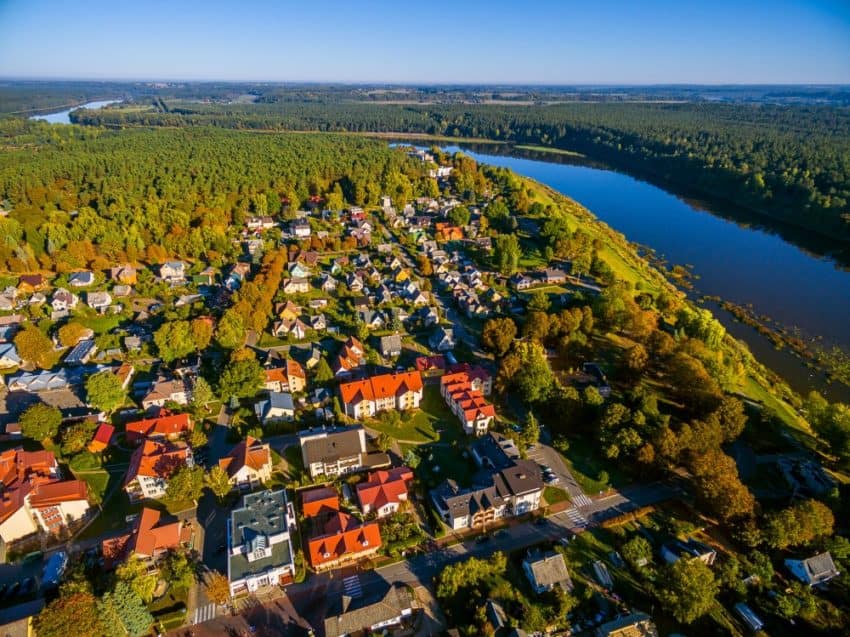
BIRSTONAS, Lithuania — Vytautas Mineral Spa sits between a manmade lake and the meandering Nemunas River deep in the forests of central Lithuania. It’s a giant white monolith looming like a mother ship over this small spa town of 2,800 people.
I walked into the spacious, airy lobby and immediately felt warmth from the sun pouring in through floor-to-ceiling windows, protecting me from the mid-30s temperatures outside. I walked among people in long white terry cloth bathrobes and slippers. Some had towels over their shoulders; others sat down chatting as if they were in their own living room. I descended a flight of stairs to see elderly ladies swimming — slowly — in a two-lane lap pool while elderly men slepted in lounge chairs along the side. In a room lit by mere candles, a woman sat motionless with her eyes closed and her mouth slightly ajar, as if in a trance of eternal bliss.
One of the bevy of beautiful young desk clerks told me in perfect English syntax how to reach a contact and handed me a slick brochure for the year-old spa. I quickly rifled through my cell calendar to see when I can fit in a Swedish leg massage.
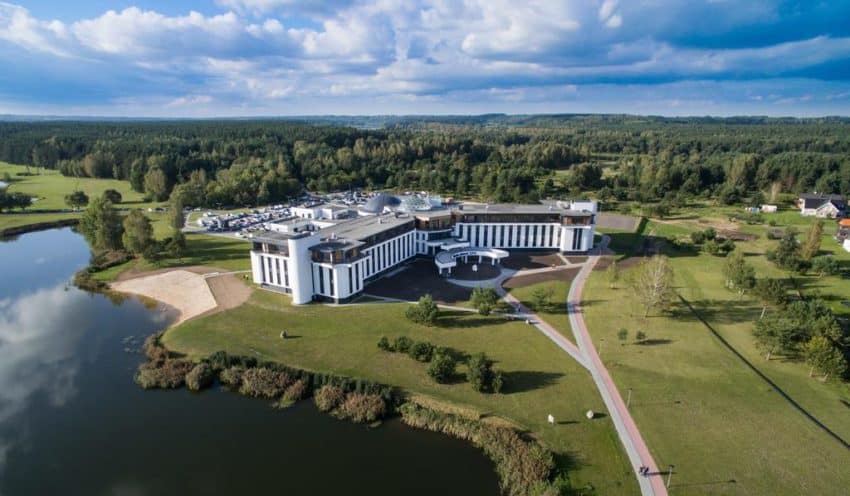
The Orange County Register in Southern California recently sent me to Lithuania to report on a basketball story. It was about a comically loud and proud father pulling his two teenage sons from school to sign them up with a Lithuanian pro basketball team. The Ball family is getting mocked and praised in equal measure and I hopped on a media bandwagon that seemingly held the world’s entire free press.
But I was one of the few who went to Lithuania to cover the brothers’ debut. I was one of the few to experience the story’s beautiful backdrop, of a country that made following the dad’s babbling megaphone for three hours all worth it. Lithuania is one of the many jewels of Eastern Europe. It’s a country of rich woods and reconstructed cities, of really good basketball and very independent people who suffered as much as any in the old Soviet Bloc. But the former “Baltic Tiger,” labeled for its huge economic growth in the 1990s, has slumped into an economic malaise where it’s losing population annually and struggling to keep 30 percent of its population above the poverty line.

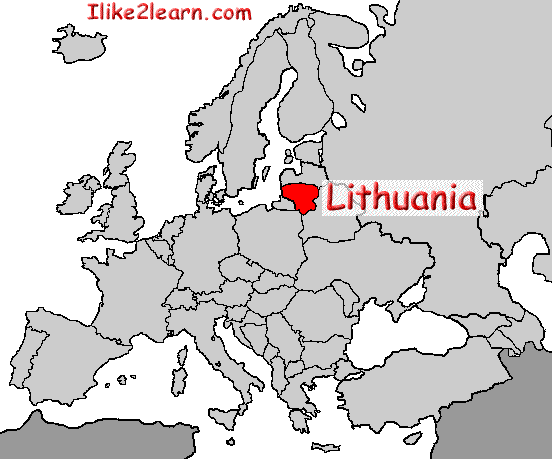
But first, let’s take a bath.
The town of Birstonas (BEER-shtone-us) sits on a plain over a vast reservoir of natural mineral water. Vytautas is one of three spas in this town that can be crossed in about the time it takes to swim a couple laps. How ironic is it that so much of the old Soviet Bloc, where suffering and stress were part of the population’s DNA, had so much soothing natural, warm mineral water right below its killing fields? I have traveled to western Czech Republic where towns are made up entirely of spas. Two years ago I visited Budapest which has seven huge spas open to the public. Now here I am in this forest village where you can start your day with a body scrub with Dead Sea salt.
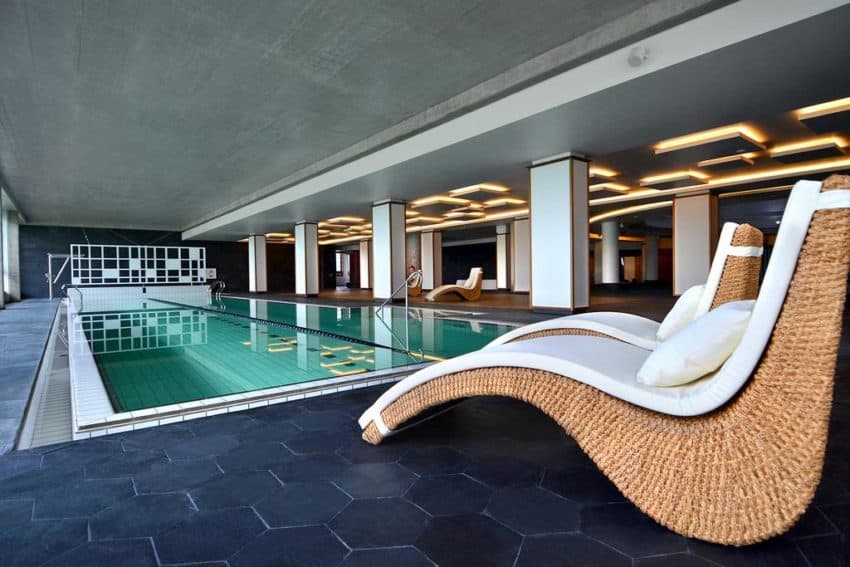
I’d been to Lithuania before. I came in the fall of 2002 for a travel story on the capital Vilnius and Riga, its sister capital in neighboring Latvia.
Back then Lithuania was changing every day. Twelve years after it became the first Soviet Bloc country to achieve independence, it was rushing toward a future of tourism and reconstruction while the long lines for food and the Soviet Union’s dark shadow were still fresh in their memories.
When I returned this month, Lithuania practically has an entire generation that doesn’t remember communism any more than American kids remember the Korean War. I saw the new Lithuania in Bir. Bur. Bar, seemingly the only bar in Birstonas but ambitiously hip. I don’t know why they left off the period after the third word in the title but it looked subtly cool.
Bir. Bur. Bar sits above a supermarket and could pass for any small-town sports bar in Iowa. It served inexpensive tap beer, a food menu right out of “Happy Days” and a TV with the channel soldered to whatever sport was being televised at the time. As I walked in to the softly lit, roomy bar, some people presented the young, fit wait staff with a birthday cake to celebrate the bar’s one-year anniversary.
I ordered a Svyturys Extra, their most popular beer, and talked to Artiom Trettjak, a muscular, 25-year-old bartender. As a Norwich City-Chelsea soccer game from England played on the TV, I asked him about the new Lithuania and this area.
“It’s getting alive,” he said with barely an accent. “It’s a very different town. There were a lot of abandoned buildings but businesses are getting money from Europe to rebuild houses and spas. Five or seven years ago it was really quiet. Not it’s really popular in Lithuania.”
I asked him what he learned about communism in school and from his parents. He gave the question a bored shrug. I felt as if I asked a stupid tourist question that he hears a lot. Actually, I ask this question a lot.
“It wasn’t so good and it wasn’t so bad,” he said. “If it was so good, it’d still be communist.”
Trettjak started a pattern that held true through my five days in Lithuania. Every person under 30 spoke fluent English. Hardly anyone over 40 could speak a word. I remember in 2002 when I saw language schools popping up all over Vilnius. People rushed to get trilingual. They were tired of Russian. English has now become Lithuania’s second language. American movies may soon come with Lithuanian subtitles.
Over their pretty passable, slow-cooked barbecue ribs, I asked another bartender about English fluency. Italy has been a republic since 1861 and the number of people fluent in English today could fit in a chapel in St. Peter’s. He said kids study English now for 10 years.
“My brother went to England for eight years,” he said. “When he came back and I showed him what I was doing he said I was studying stuff professors there do.”
Lithuanians are notoriously friendly. I noticed that on my first trip. Except for the no-neck, ex-Soviet hitman/doorman at my hotel’s gentleman’s club, everyone was so helpful with directions, language and history. Lonely Planet called them the “Italians of the Baltics.” All Lithuanians should take that as the ultimate compliment. Italians remain the nicest people I’ve ever met.
Sometimes it comes out of nowhere. Each day I took the seven-mile, 70-centesimi bus ride to Prienai, a town of under 10,000 where the poorly funded local basketball team hitched its wagon on the Balls’ back, hoping the publicity would earn them some financial breathing room. I made a beeline to Tango Pizza which made The New York Times two weeks earlier by displaying on their electronic message board: “TANGO PIZZA WELCOMES BALL FAMILY TO PRIENAI CITY!!!!!”
By the time I arrived, they had edited it to the more anglicized “PRIENAI GOT BALLS!!!!” Inside is some pretty good pizza and husband-wife owners who couldn’t have been nicer if they ran a bed & breakfast. Janius Malisauskas, 36, gave me a ride to the arena on game night and back afterward to my AirBnB in Birstonas. That’s due to the game’s late finish and that Prienai’s lone public transportation is one cab driver who sometimes is just plain busy.
Malisauskas also is a pretty good social observer. As a small business owner, he’s seen how the steady exodus of people has hurt the Lithuanian labor pool and the economy. On our drive back to Birstonas, he told me Lithuania’s biggest problem is insecurity.
Like many former Soviet republics, the confetti hadn’t been cleaned up from their celebration of independence when they were hit with the jarring realization that they were on their own. Mother Russia wasn’t there to prop up the local factory. Before they had money to buy things but nothing to buy. Suddenly, they had things to buy but no money to buy them.
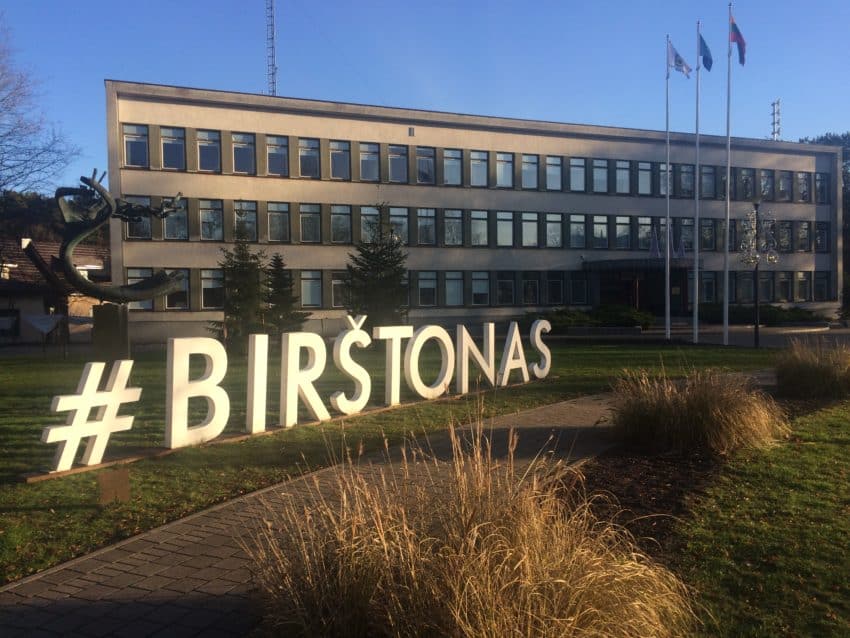
“Insecurity comes from a lack of confidence foremost,” he told me. “And how can we have a self confidence when our country is independent for so short time and had a bloody history because of us being so small? …
The youth know less and less about it but more and more about capitalism and democracy, enough so they would know they sure don’t miss it at all.”
Evidence of communism can still be seen around rural Lithuania. Prienai (PREE-ah-nay) Arena, where Birstonas-Prienai Vytautas plays, is down a long, windy road past a yellow, crumbling, Soviet-era storage shelter. You can also see it on the people’s faces. While the youth greeted me with smiles and handshakes, the elderly Lithuanians glared. They just sat there and glared. Tired, beaten down, haggard, only their decent clothes separated them from the sad, grainy photographs I saw of Eastern Europe during Soviet occupation.
I’d sit at bus stations and old wrinkled men and women would look gloomily into space as if the weight and memories of communism didn’t leave when the tanks did. They’d stare at me, with their eyes narrowing and their mouths forming a slight sneer, like I was ghost of KGB past. I looked down to see if I was wearing jackboots.
My problem is I remain obsessed with communism. It has been 28 years since it died on these frozen fields and rivers and villages. Yet every time I visit a former Soviet Bloc country I look for left over traces, like a grave robber searching for skeletons. It might be an old blockish apartment building. Maybe a boarded-up factory. Even the ol’ reliable trams that plod across capitals make me think of the proletariat who stood where I did.
I grew up during the Cold War. The USSR was our enemy and while my University of Oregon’s sociology department was mostly Marxist, I had more sympathy for these countries than my professors had admiration. How does one live in a country with walls, with food lines, with more prisons than newspapers? How do they handle that suffering when I stressed over not finding a date for my fraternity house dance?
It’s why to this day I admire those people more than any others. I love the men’s resiliency, the women’s independence, the capitals’ restorations. Next to Italy and the Caribbean it remains my favorite part of the world.
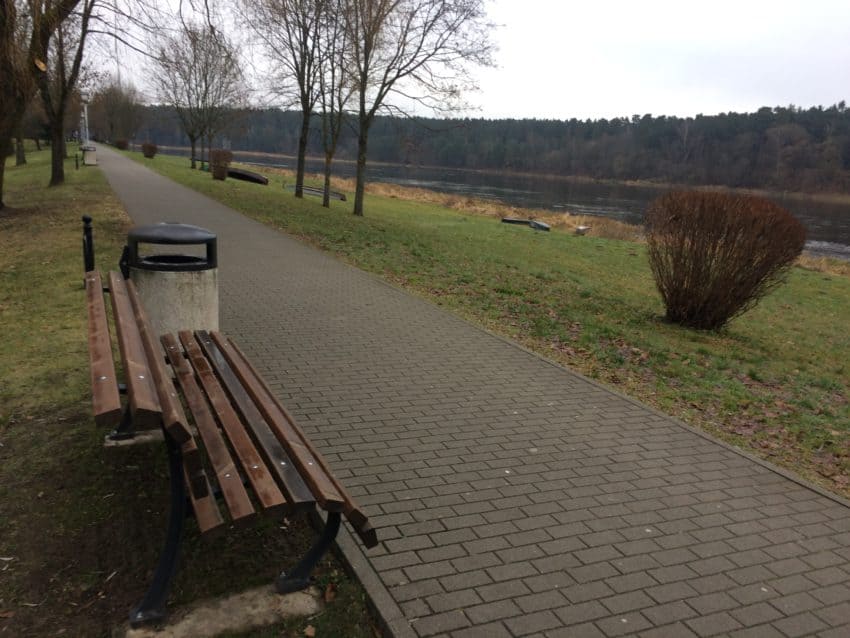
They try so hard. A five-minute walk from my wonderful AirBnB, where I had practically an entire house for 25 euros, I came to the riverfront. Birstonas had built a wonderful jogging/bike/walking path along the Nemunas River that stretched past modern hotels, apartments and playgrounds then curved into a dense forest before emptying at the Vytaunas Spa. New, wooden benches were evenly spaced along the walk. I could’ve been in Aspen and not just because I was bundled in a hooded parka and gloves against the 30-degree temperature. Then an old man with a crude fishing pole walked down to the river to catch, what, dinner?
About 30 percent of the Lithuanian population lives on the verge of poverty, according to government statistics. No wonder Lithuania has lost population every year since 1992, with a record number of 50,000 leaving in 2016. Once the borders opened, Lithuanians left, leaving the country with a labor shortage.
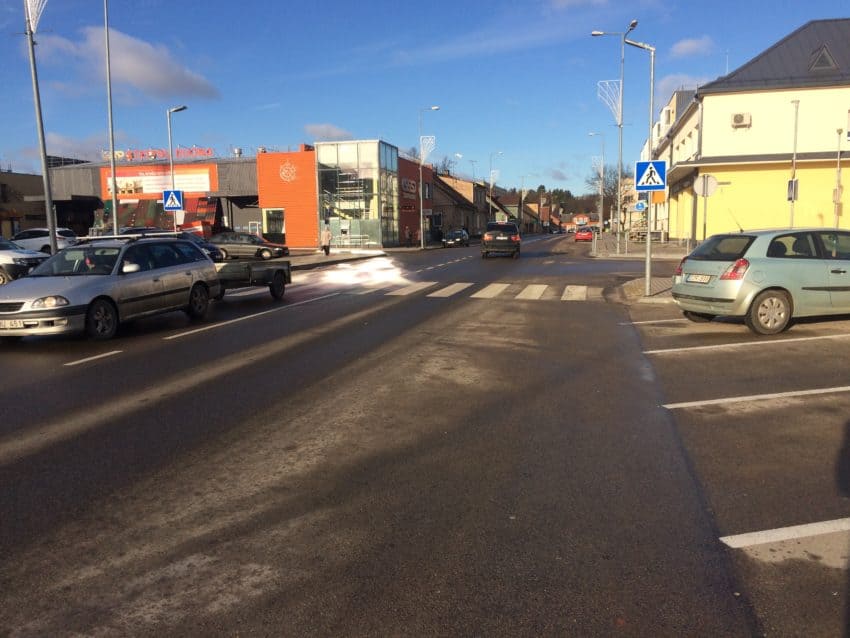
The government is trying to lure them back. I met with Prienai mayor Alvydas Vaicekauskas in his modest office in a big, modern building on Prienai’s drab main drag, lined with retail stores, small apartment buildings and a couple of kabob shops. He sheepishly told me Prienai still doesn’t have a proper restaurant. Haute cuisine in Prienai remains Tango Pizza.
Bald and bespectacled in a sharp blue suit and red tie, Vaicekauskas greeted me with a smile as if I was his long, lost son. He, along with his town, could not be happier with all the attention the Ball family have brought them. Before they arrived, causing a media frenzy at the airport similar to the arrival of Elvis, Prienai’s biggest claim to fame was hosting the world gliding championships.
What they don’t talk about much is Aug. 27, 1941. That’s when the Nazi murder unit called Rollkommando Hamann came to Prienai and murdered 1,078 Jews. They were among the 60,000 Lithuanian Jews killed by the end of 1941, part of the 80 percent of the Jewish populace that was exterminated.
Vaicekauskas has lived in Prienai since the ‘80s and the past is long gone. He wished more people realized that.
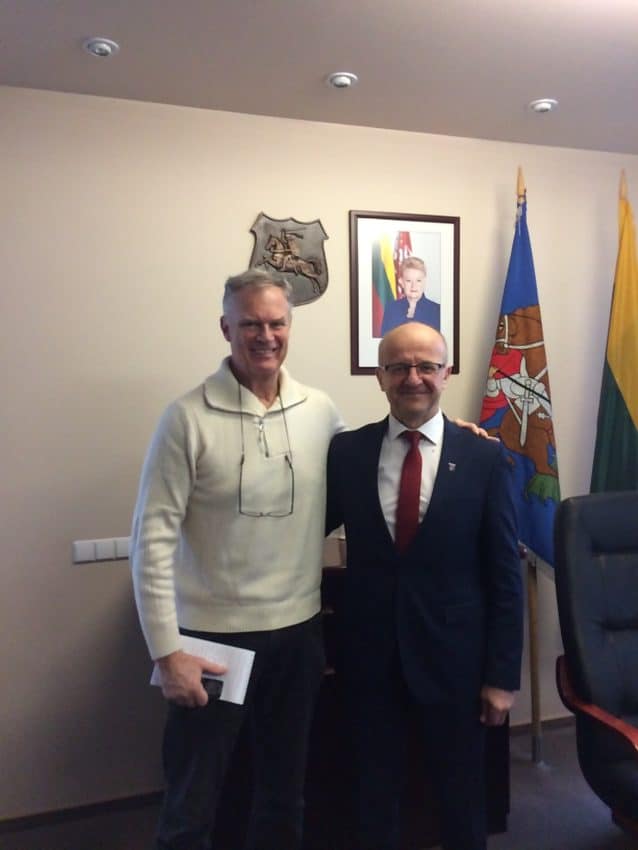
“People who emigrated from Prienai region, they come back and do not recognize Prienai,” he said through an interpreter. “We have renovated houses, renovated streets, the environment also renovated. I’m sorry there is much and much less people in Prienai but that’s also the problem in Lithuania.”
I finished my trip with an afternoon in Vilnius, and the two-hour bus ride through the beautiful forests revealed some of Lithuania’s soft underbelly. Run-down wooden homes. Broken-down farm houses. Yellow paint chipped to reveal wood on abandoned buildings. Broken fences. These are the places in rural Lithuania that democracy missed.
Then I arrived in glittery Vilnius. I remembered it well from 2002 when I spent a few hours in the not-so-subtly named Museum of the Genocide of the Lithuanian People. It’s the former prison that covers an entire city block and was used until 1991. I remember standing in small torture rooms proofed for sound to muffle the screams. I saw straitjackets used to prevent suicides.
Then I walked a block and had potato pancakes topped with salmon in a cozy cafe that looked 19th century but was instead built in the 1990s. This time I sought Lokys, established in a merchant’s house in the “Old Town” in 1972 as a “hunter’s restaurant.” It serves quail, game sausage, venison and wild boar in cranberry sauce in small, warm rooms with patterns of climbing vines on the walls.
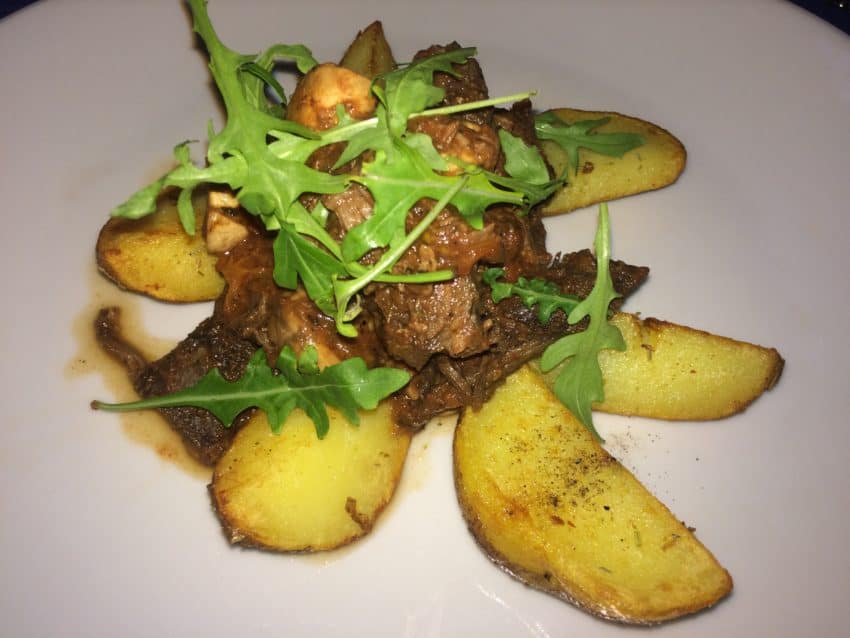
I ordered the beaver stew, very gamey meat inside a circle of farm-cut potatoes and sprinkled with small leaves. With a glass of Lithuania’s signature red berry wine, I contemplated where in the world are there beavers in Lithuania. I’m from the Beaver State, Oregon, and never saw a beaver there, either. Shallow thoughts after five days of deep contemplation before heading to the airport. But after five days in lovely Lithuania, where the girls are as tall as I am and the people are much stronger, I knew where I wanted to head instead.
A spa.


January 21, 2018 @ 5:08 am
excellent post, very informative. I wonder why the other specialists of this sector don’t understand this. You must continue your writing. I am sure, you have a huge readers’ base already!
January 21, 2018 @ 10:10 am
Thanks for the encouragement, Alex. My readership is slowly growing but not near where I want to be. I can write. I just can’t market.